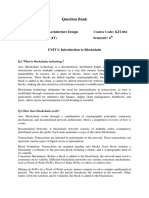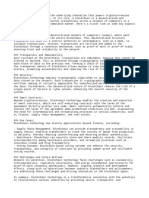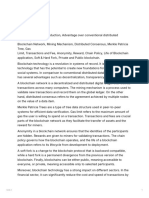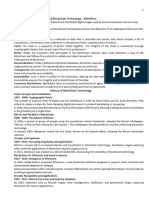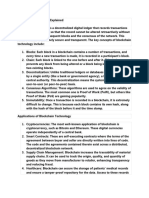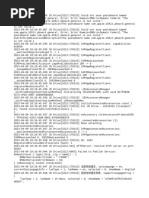Blockchain Technology
Blockchain Technology
Uploaded by
kkpatilb21Copyright:
Available Formats
Blockchain Technology
Blockchain Technology
Uploaded by
kkpatilb21Copyright
Available Formats
Share this document
Did you find this document useful?
Is this content inappropriate?
Copyright:
Available Formats
Blockchain Technology
Blockchain Technology
Uploaded by
kkpatilb21Copyright:
Available Formats
Blockchain Technology:
Blockchain is a distributed ledger technology that stores transaction records (blocks) in a
decentralized and immutable manner. Each block contains a cryptographic hash of the previous
block, creating a chain of blocks. This transparency and immutability make blockchain ideal for
applications requiring trust and security. In finance, blockchain enables peer-to-peer transactions
without the need for intermediaries, reducing costs and transaction times. Supply chain
management benefits from blockchain by providing transparency and traceability of goods from
production to delivery. Additionally, blockchain is used in identity verification, voting systems, smart
contracts, and digital rights management.
Blockchain is a decentralized and distributed ledger technology that enables secure and transparent
recording of transactions across a network of computers. Each block in the blockchain contains a
cryptographic hash of the previous block, along with transaction data. This creates a chain of blocks,
hence the name "blockchain," and ensures the integrity and immutability of the data.
Key Components of Blockchain:
Decentralization: Unlike traditional centralized systems where data is stored on a single server or a
small group of servers controlled by a central authority, blockchain operates on a decentralized
network of computers (nodes). Each node maintains a copy of the blockchain, and all nodes work
together to validate and record transactions, ensuring transparency and resilience against single
points of failure.
Cryptographic Security: Blockchain uses cryptographic techniques to secure transactions and ensure
the integrity of the data. Each transaction is cryptographically signed by the sender using their
private key and verified by other nodes in the network using the sender's public key. This ensures
that transactions are authentic and tamper-proof.
Consensus Mechanisms: Consensus mechanisms are protocols used by blockchain networks to
achieve agreement among nodes on the validity of transactions and the state of the blockchain.
Popular consensus mechanisms include Proof of Work (PoW), Proof of Stake (PoS), and Delegated
Proof of Stake (DPoS). These mechanisms incentivize network participants to contribute
computational resources or stake tokens to validate transactions and secure the network.
Applications of Blockchain:
Cryptocurrencies: The most well-known application of blockchain technology is cryptocurrencies,
such as Bitcoin and Ethereum. These digital currencies use blockchain to enable peer-to-peer
transactions without the need for intermediaries like banks. Blockchain ensures the security and
transparency of transactions, allowing users to transfer value globally with minimal fees and without
the need for trust in a central authority.
Supply Chain Management: Blockchain is being used to improve transparency and traceability in
supply chains across industries such as food, pharmaceuticals, and luxury goods. By recording the
movement of goods on a blockchain, companies can track products from their origin to the end
consumer, ensuring authenticity, reducing fraud, and improving accountability.
Smart Contracts: Smart contracts are self-executing contracts with the terms of the agreement
directly written into code. These contracts automatically execute and enforce themselves when
predefined conditions are met, eliminating the need for intermediaries and reducing the risk of fraud
or manipulation. Blockchain platforms like Ethereum enable the deployment of smart contracts for
various use cases, including insurance, real estate, and decentralized finance (DeFi).
Identity Management: Blockchain-based identity management solutions offer a secure and
decentralized way to verify and authenticate identities. Users can control access to their personal
data and share it with trusted parties without relying on centralized identity providers. Blockchain
identity platforms enhance privacy, security, and interoperability of identity data across different
services and applications.
Tokenization of Assets: Blockchain enables the tokenization of real-world assets, such as real estate,
art, and securities, by representing them as digital tokens on a blockchain. These tokens can be
traded and transferred seamlessly, providing liquidity and fractional ownership of traditionally illiquid
assets. Tokenization democratizes access to investment opportunities and reduces barriers to entry
for investors.
Overall, blockchain technology has the potential to disrupt various industries by providing secure,
transparent, and efficient solutions to longstanding challenges. As the technology continues to
evolve and mature, we can expect to see even more innovative applications and use cases emerge in
the coming years.
You might also like
- Block Chain Unit-1Document17 pagesBlock Chain Unit-1paramata priya madhuriNo ratings yet
- VHLC ManualDocument268 pagesVHLC ManualMat CamNo ratings yet
- Lis 889 Complete Metadata SchemaDocument12 pagesLis 889 Complete Metadata Schemaapi-280132693No ratings yet
- A History of Computer Programming LanguagesDocument5 pagesA History of Computer Programming LanguagesDalitso100% (1)
- BCT Unit 1 - 241104 - 094843Document13 pagesBCT Unit 1 - 241104 - 094843sadiasajidshaikNo ratings yet
- Blockchain TechnologyDocument16 pagesBlockchain Technologystar5lakandriNo ratings yet
- (Kit061) Blockchain QuestionbankDocument36 pages(Kit061) Blockchain Questionbankranjeet2213005-dNo ratings yet
- KamyaVermaXI BDocument13 pagesKamyaVermaXI Bvermakamya238No ratings yet
- LMS 13Document11 pagesLMS 13prabakar1No ratings yet
- UNIT I Blockchain NotesDocument19 pagesUNIT I Blockchain Notesmanoj tilakchandNo ratings yet
- What Is BlockchainDocument2 pagesWhat Is Blockchainsantunsantoso013No ratings yet
- Blockchain Technology - Unit-1Document28 pagesBlockchain Technology - Unit-1Tejashwi tejuuNo ratings yet
- Blockchain ReflectionDocument3 pagesBlockchain ReflectionNirakar BeheraNo ratings yet
- AL802 (A) Blockchain PracticalDocument29 pagesAL802 (A) Blockchain PracticalPreet TamrakarNo ratings yet
- Unit 2Document52 pagesUnit 2shreya kharolaNo ratings yet
- Blockchain Technology Transforming The Digital LandscapeDocument8 pagesBlockchain Technology Transforming The Digital Landscaperitesh9421373768No ratings yet
- Blockchain Technology PPT (4L2)Document10 pagesBlockchain Technology PPT (4L2)weroyo2936No ratings yet
- BCT Unit1Document12 pagesBCT Unit1Aarthi AstroNo ratings yet
- Block Chain Unit-1Document18 pagesBlock Chain Unit-1pilli maheshchandraNo ratings yet
- Block ChainDocument35 pagesBlock ChainSai VamshiNo ratings yet
- Blockchain Technology Is A DecentralizedDocument2 pagesBlockchain Technology Is A DecentralizedNakanakanaknakNo ratings yet
- Imp QDocument13 pagesImp Qdivye.jainNo ratings yet
- CHAPTER 1 DissertationDocument110 pagesCHAPTER 1 Dissertationsimpykalla29No ratings yet
- Blockchain NotesDocument46 pagesBlockchain Notesshrivastavaaadi151No ratings yet
- Block ChainDocument7 pagesBlock Chainfiraolbayisa420100% (1)
- Trust of BlockchainDocument2 pagesTrust of BlockchainKumar MadanpuriNo ratings yet
- NodejsDocument1 pageNodejsvaibhavwani008No ratings yet
- BlockchainDocument4 pagesBlockchainAbir HasanNo ratings yet
- Introduction To Blockchain Technology PDFDocument15 pagesIntroduction To Blockchain Technology PDFvychuvyshnav491No ratings yet
- Unit 1Document92 pagesUnit 1rocky2003rajkumarNo ratings yet
- Introduction To Blockchain Technology PDFDocument16 pagesIntroduction To Blockchain Technology PDFkristianalee44No ratings yet
- BlockchainDocument4 pagesBlockchainkennymike899No ratings yet
- BCT Unit-1Document46 pagesBCT Unit-1Sashank AvinashNo ratings yet
- Block ChainDocument1 pageBlock Chainmhamzayasin20024No ratings yet
- Assignment 3Document25 pagesAssignment 3BWENGYE JUSTUSNo ratings yet
- Block Chain PDFDocument7 pagesBlock Chain PDFVanshikaNo ratings yet
- Cryptocurrency and Blockchain Technology 1Document10 pagesCryptocurrency and Blockchain Technology 1jirwankartusharNo ratings yet
- Blockchain 1Document10 pagesBlockchain 1jrajput2175No ratings yet
- What Is BlockchainDocument2 pagesWhat Is BlockchainVIPLAV SRIVASTAVNo ratings yet
- Unit I Blockchain Notes 1Document19 pagesUnit I Blockchain Notes 1ackermanleviii07No ratings yet
- BCT U1&2Document38 pagesBCT U1&2pothulanandini3No ratings yet
- Enterprise Systems and Blockchain TechnologyDocument10 pagesEnterprise Systems and Blockchain Technologywm364740No ratings yet
- Lecture Text 4 - Introduction To Blockchain TechnologyDocument2 pagesLecture Text 4 - Introduction To Blockchain TechnologyJuan BrattiNo ratings yet
- doc4Document1 pagedoc4williambusy5No ratings yet
- computer science CwDocument2 pagescomputer science Cwa victim to this scam websiteNo ratings yet
- BLOCK CHAIN UNIT 1 (1)Document24 pagesBLOCK CHAIN UNIT 1 (1)nameofuseralreadytakenNo ratings yet
- What Is Blockchain?: by Mortal Eyes GamingDocument10 pagesWhat Is Blockchain?: by Mortal Eyes GamingMortal Eyes GamingNo ratings yet
- Blockchain Synopsis (2)Document6 pagesBlockchain Synopsis (2)likithgn17No ratings yet
- Blockchain Technology (2)Document12 pagesBlockchain Technology (2)star5lakandriNo ratings yet
- BCT Unit - 1Document10 pagesBCT Unit - 1adityasatyaprakash9No ratings yet
- BlockChain - Concepts1Document3 pagesBlockChain - Concepts1SANKET AGRAWALNo ratings yet
- Blockchain TechnologyDocument2 pagesBlockchain TechnologyMary PeaceNo ratings yet
- BCT Unit-1 21.8.2023 TodayDocument21 pagesBCT Unit-1 21.8.2023 TodayKoti RondiNo ratings yet
- Project On BlockchainDocument29 pagesProject On BlockchainNeha DeswalNo ratings yet
- Blockchain Technology ExplainedDocument2 pagesBlockchain Technology ExplaineddusabeyezusangwafabriceNo ratings yet
- Script 1.3Document2 pagesScript 1.3johndavidalmonte91No ratings yet
- Imp Q&a (BCWS)Document26 pagesImp Q&a (BCWS)Krishna KiritiNo ratings yet
- Computer PresentationDocument7 pagesComputer Presentationmarrywillson95No ratings yet
- BK 1Document5 pagesBK 1jadhavabhi1152No ratings yet
- BlockchainDocument1 pageBlockchainaankurkhannaNo ratings yet
- Overview-of-Blockchain (1)Document10 pagesOverview-of-Blockchain (1)MADHU SINGHNo ratings yet
- Review of Related Literature of A RestaurantDocument4 pagesReview of Related Literature of A Restaurantjessa may82% (22)
- Unit 1 HDL DesignDocument93 pagesUnit 1 HDL DesignSavi AkolkarNo ratings yet
- EzIdentity EndToEnd Security SDKDocument2 pagesEzIdentity EndToEnd Security SDKVikram SareenNo ratings yet
- Atoll 3.4.0 User Manual MicrowaveDocument352 pagesAtoll 3.4.0 User Manual Microwavedungbt81No ratings yet
- Algorithms TutorialsDocument577 pagesAlgorithms Tutorialsanubhavjain28decNo ratings yet
- 12 CS Summer - Vacation - Holiday - HW - 2024-25Document5 pages12 CS Summer - Vacation - Holiday - HW - 2024-25ritup6692No ratings yet
- HG556 ADocument48 pagesHG556 Awawans67620% (1)
- Mano MPMC Lesson PlanDocument4 pagesMano MPMC Lesson Plantmuthu123No ratings yet
- VERITAS Global Cluster Manager™Document2 pagesVERITAS Global Cluster Manager™Wazzupdude101No ratings yet
- Fahrenheit ManualDocument16 pagesFahrenheit ManualRicardo PérezNo ratings yet
- WhitePaper Cybersecurity ENGDocument10 pagesWhitePaper Cybersecurity ENGGavazzi JuarezNo ratings yet
- Shahnawaz Ali: Permanent Address: Cell: E-Mail: Nic No: Date of BirthDocument2 pagesShahnawaz Ali: Permanent Address: Cell: E-Mail: Nic No: Date of BirthYasir RazaNo ratings yet
- CadTools Reference ManualDocument82 pagesCadTools Reference ManualrobinNo ratings yet
- LogDocument24 pagesLogcintapuspita2003No ratings yet
- UsbFix ReportDocument9 pagesUsbFix ReportJuan Del CastilloNo ratings yet
- 4th Quarter Periodical Test Questionnaire ETECH 2024Document3 pages4th Quarter Periodical Test Questionnaire ETECH 2024ellenmansueto21No ratings yet
- Y9 2019 PDFDocument180 pagesY9 2019 PDFjorge parra h100% (3)
- Illustrator Shortcut Key IndexDocument3 pagesIllustrator Shortcut Key IndexZsaniNo ratings yet
- IT Practical File Main 2023-24Document45 pagesIT Practical File Main 2023-24GagandeepNo ratings yet
- Implementing Enterprise Storage SolutionsDocument36 pagesImplementing Enterprise Storage SolutionsJUAN CARLOS AMARANTO GONZALEZNo ratings yet
- Um en FL Switch Cli 110152 en 00Document98 pagesUm en FL Switch Cli 110152 en 00matias viverosNo ratings yet
- Tutorial 3-4-5 - MergedDocument14 pagesTutorial 3-4-5 - MergedDr. Muhammad TayyabNo ratings yet
- Soal LKS Network Support Majalengka 2014Document5 pagesSoal LKS Network Support Majalengka 2014Indra GunawanNo ratings yet
- Bcs 62Document13 pagesBcs 62Sudhakar SinhaNo ratings yet
- 18 10 45Document8 pages18 10 45Delieta GaudetNo ratings yet
- Tle 6 Safe and Responsible Used of IctDocument1 pageTle 6 Safe and Responsible Used of IctNhuran YecpotNo ratings yet
- 4 - Interface Support and ConfigurationDocument20 pages4 - Interface Support and ConfigurationRuben Felipe MunguiaNo ratings yet






